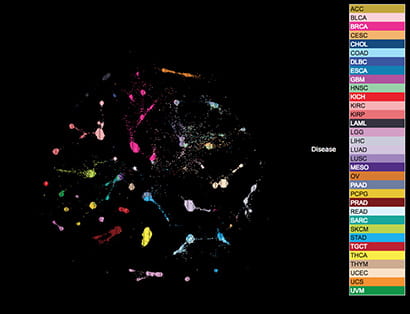April 05, 2018
By Aylin Woodward
Typically cancers are classified by where they originate in the body—think breast cancer, stomach cancer, and so on. But a collaboration called the Pan-Cancer Initiative, launched in 2012 at a meeting in Santa Cruz, California,sought to study cancers from a new angle—a molecular one. Preliminary analyses showed cancers that start in different organs actually share commonalities at the molecular level, whereas cancers that originate from the same tissue can have very different genomic profiles.
Now, the Pan-Cancer Initiative has released the results of a much larger analysis of genomic and molecular data characterizing 33 different types of cancer from more than 10,000 patients. Called the Pan-Cancer Atlas, it is the most comprehensive cross-cancer analysis to date and is the final output of The Cancer Genome Atlas (TCGA) program, a joint effort of the National Cancer Institute (NCI) and the National Human Genome Research Institute (NHGRI). The results appear in 27 papers published April 5 in Cell, Cancer Cell, Cell Reports, and Immunity.
“Insights about how one type of cancer relates to another form of the disease can have real clinical implications,” said Josh Stuart, Baskin Professor of Biomolecular Engineering at UC Santa Cruz and an organizer of the Pan-Cancer Initiative. “In some cases, we can borrow clinical practices from better-known diseases and apply them to cancers for which treatment options are less well defined.”
Stuart’s main collaborators on the pan-cancer analyses have been Christopher Benz, professor of cancer and developmental therapeutics at the Buck Institute for Research on Aging and a clinical oncologist at UC San Francisco, and Christina Yau, assistant adjunct professor of surgery at UCSF and a senior scientist at the Buck Institute. Stuart and Benz are co-directors of the UCSC-Buck Institute Genome Data Analysis Center, one of seven national centers in the TCGA Research Network.
[ Read More ]
